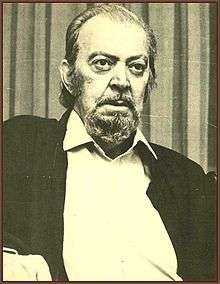Tassos Leivaditis
Anastasios-Pandeleïmon "Tassos" Leivaditis (Greek: Αναστάσιος-Παντελεήμων "Τάσος" Λειβαδίτης; 1922–1988) was a Greek poet.[1]
Tassos Leivaditis | |
|---|---|
 | |
| Born | 15 April 1922 Athens, Greece |
| Died | 30 October 1988 (aged 66) Athens, Greece |
| Occupation | Poet; writer; essayist; screen writer; literary critic; lyrics writer |
| Citizenship | Greek |
| Literary movement | Modernism |
Early life
Leivaditis was born on Easter Saturday[2] 15 April 1922 in Athens, Greece, to parents Lýsandros Leivaditis and Vassiliki Kondopoulou.[3] His family originated from the region of Kontovazaina, in Peloponnese. He grow up in Metaxourgeio. He had four older siblings, three brothers and one sister. His father was a merchant and he lived a happy childhood.[4]
Resistance during the Occupation
He enrolled in the University of Athens' Law school in 1940, but at the onset of the German occupation of Greece, in 1941, abandoned his studies and joined the Resistance and the National Liberation Front's youth organisation EPON.[5] In 1943, during the Occupation, his father died.[3]
Political activism
After the liberation, in 1944, he continued to be politically active in the Left, which led to his arrest. He was released in February 1945, after the Varkiza Agreement between the national government and the Left.
In 1946, Leivaditis married Maria Stoupa, daughter of Georgios Stoupas and Alexandra Logotheti and published his first poem "Tο τραγούδι του Xατζηδημήτρη" (Hadjidimitris' song) in the Free Letters literary magazine, edited by Dimitris Photiades.[1] In 1947, he was among the groups that worked for the publication of the literary magazine Themelio (Foundation).
He was arrested again, in 1948, during the Civil War, and exiled at Moudros on the island of Lemnos.[3] In 1949, when the Civil War ended with the side of the national government victorious, he was transferred to the main place of exile and imprisonment for Greek Leftists, the Makronisos island. Asked repeatedly to repent and denounce his "traitorous" and "subversive" beliefs, he refused and was eventually transferred to the prison on Agios Efstratios island and then to the Hadjicostas prison in the mainland. In 1951, his mother died; Leivaditis signed the denunciation papers and was released.[1]
He started working in 1954 as a literary critic in the Left's main newspaper Avgi (Dawn), a position he held up to 1967. During his years in imprisonment and exile, Leivaditis had composed a number of poems, among which was "Winds At The World's Crossroads", considered by the authorities to be "subversive" when it was first published, so in 1955 he was arrested and charged with "incitement to rebellion." The Court of Appeals declared him not guilty in the trial held the same year.[1] The poem itself was awarded the First Prize for Poetry at the 1955 World Youth Festival held in Warsaw.[3]
Dictatorship
The military coup of 21 April 1967, rendered Leivaditis unemployable, on account of his political ideology. Eventually, he started writing, in 1969, under various pen names for popular, mass-circulation magazines of the time, such as Fantasio, hired, as were many other writers of the Left, by editors and publishers despite the political risks.[6]
Poetry
Leivaditis' poetry remained largely unknown outside his native land until the 1983 publication in English of his collection The Blind Man with the Lamp simultaneously to its publication in Greece.[7] Critics found that despite his presumed beliefs, Leivaditis' poetry dealt with the metaphysical in a way that went beyond materialism. The independent Anglican weekly newspaper Church Times found his poetry to be "closer to St John of the Cross's paradoxical profundities"[8] and speaking of the poet's "experience of God with a directness saved from portentousness by a vein of levity."[8] [9] Another reviewer stated that Leivaditis' poems although "merciless confrontations with the real" are "no monochrome paean to resignation" but read as "essentially elegies for existence."[10]
Screenwriting
Leivaditis co-wrote with Greek author Kostas Kotzias the scenario for one of Greece's first neorealist films, Synoikia To Oneiro (Neighborhood The Dream), directed by and starring actor director Alekos Alexandrakis and distributed in 1961. The authorities delayed permission for its premiere due to its "suspicious social content," and the fact that the soundtrack was composed by Mikis Theodorakis, initially allowing it to be shown only in Athens.[11] Despite the many censorship cuts imposed by the competent Ministry, with the cut material having been destroyed, the film is considered a milestone in the history of Greek cinema.[12][13]
Touring
The collaboration with Mikis Theodorakis, whom Leivaditis had first met when they were both in exile in the 1940s, continued in the field of songwriting, with the Greek composer putting many of Leivaditis' poems to music.[14] Leivaditis often accompanied Theodorakis in his many tours, reciting poetry as part of the concert.[14]
Death
Leivaditis died on 30 October 1988, at the Athens General Hospital, due to complications from two aorta aneurism surgeries.
See also
References
- Tassos Leivaditis website, maintained at the University of the Aegean (in Greek)
- 1922, Greek Orthodox Calendar (in Greek)
- "Leivaditis: That is how our flags were born", TVXS webTV (in Greek)
- "Ethnikon Kentro Vivliou".
- Leivaditis, Tasos 1922-1988, National Book Center (in Greek)
- "The poet in the land of Fantasio", To Vima, 10/11/2008 (in Greek)
- The Blind Man with the Lamp by Denise Harvey, publisher, 2014
- "The inner weather" by Fraser Steel, Church Times, 22 July 2016
- "A metaphysics of the Left: The religious awe" by Michalis Merakles, To Dentro, 3 November 2009 (in Greek)
- "Andy Jackson reviews The Blind Man With The Lamp by Tasos Leivaditis" by Andy Jackson, Mascara Literary Review, 16 September 2015
- "A legendary neighborhood, an accursed movie" by Yannis Zoumboulakis, To Vima, 5 June 2011 (in Greek)
- "To Oneiro and communist propaganda", The Theater, 4 November 2014 (in Greek)
- "Neighborhhood was allowed to be shown only after PM Karamanlis' intervention", Greek Cinematography, 8 March 2016 (in Greek)
- "Theodorakis & Leivaditis", TheToc, 22 December 2014 (in Greek)